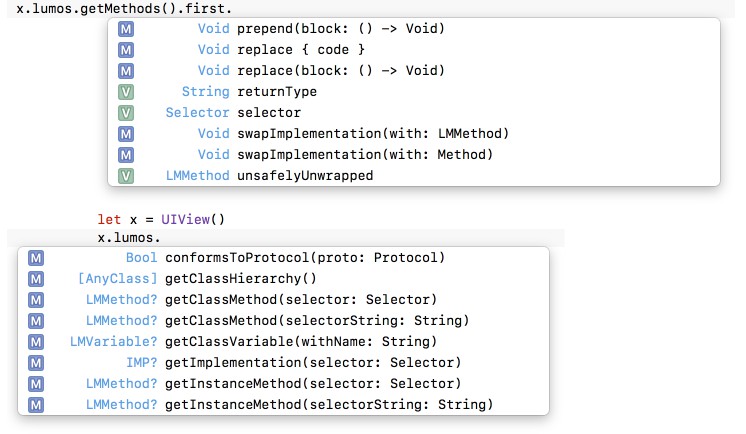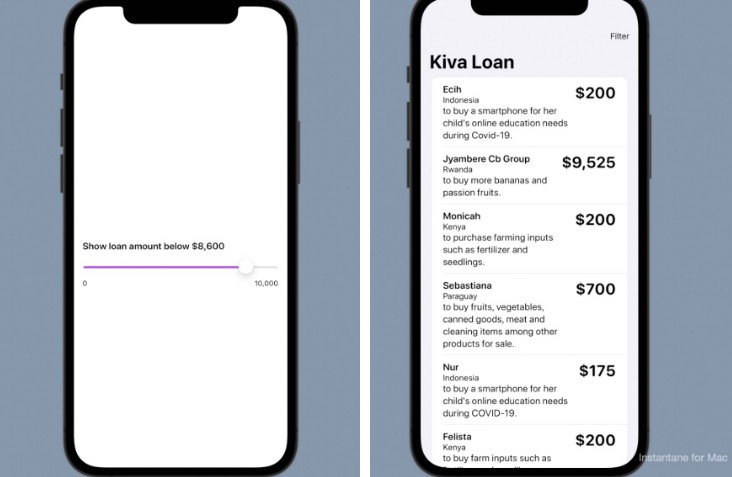
A light wrapper around Objective-C Runtime.
What exactly is lumos?
lumos as mentioned is a light wrapper around objective-c runtime functions to allow an easier access to the runtime. It makes operations such as swizzling and hooking very simple in Swift.
For example, say you wish to run a block of code whenever a ViewController's viewDidLoad method is called
With lumos, you can do the following:
// In AppDelegate (or any conveinient place)..
let method = Lumos.for(ViewController.self).getInstanceMethod(selector: #selector(ViewController.viewDidLoad))
method?.prepend {
// This block will be run every time a viewDidLoad is called
print("View Controller loaded")
}
Similarily you can append a block to a method which will be called right before the method returns. You can even use replace to replace the method's implementation with the block you pass in as a parameter.
If you wanted more flexibility, you could swizzle the viewDidLoad method using the following lines:
@objc func myMethod() {
// Do anything here
}
let myMethod = self.lumos.getInstanceMethod(selector: #selector(myMethod))
method?.swapImplementation(with: myMethod)
Do you feel the superpower yet? Maybe you wish to list all the classes registered at runtime:
Lumos.getAllClasses()
Fun Fact: There are almost 12,000 classes registered at runtime Try Lumos.getAllClasses().count
You could get the class hierarchy of any class just with:
myObject.lumos.getClassHierarcy() // For UIView: [UIView, UIResponder, NSObject]
Fun Fact: Some classes such as URLSessionTask are actually dummy classes which are replaced with underlying classes such as __NSCFLocalSessionTask during runtime.
With lumos, you can iterate through variables, functions, protocols etc and meddle with them at runtime. Have fun exploring!
Usage
Just incantate .lumos on any instance of a NSObject subclass or use Lumos.for(object) for where object is of type AnyClass, AnyObject, Protocol, Ivar, objc_property_t or objc_property_attribute_t.


P.s The code itself is the documentation for now. There are many more methods that lumos offers which are not discussed in this document. Cheers :)
Why lumos?
The Objective-C Runtime provides many powerful methods to manipulate objects, classes and methods at runtime. Although disasterous when misused, these methods provide a great way to peek into the runtime and meddle with it.
However, the methods are not exactly easy to use sometimes. For example the following method is used to obtain a list of all classes registered at runtime:
func objc_getClassList(_ buffer: AutoreleasingUnsafeMutablePointer<AnyClass>?, _ bufferCount: Int32) -> Int32
Often, a lot of dirty work needs to be done before one gets the list out. Here is how I would do it:
static func getClassList() -> [AnyClass] {
let expectedClassCount = objc_getClassList(nil, 0)
let allClasses = UnsafeMutablePointer<AnyClass?>.allocate(capacity: Int(expectedClassCount))
let autoreleasingAllClasses = AutoreleasingUnsafeMutablePointer<AnyClass>(allClasses)
let actualClassCount: Int32 = objc_getClassList(autoreleasingAllClasses, expectedClassCount)
var classes = [AnyClass]()
for i in 0 ..< actualClassCount {
if let currentClass: AnyClass = allClasses[Int(i)] {
classes.append(currentClass)
}
}
allClasses.deallocate()
return classes
}
Now all you would need to do to obtain the list of classes would be to invoke this method. Maybe you wish to get a list of classes that conform to a certain protocol:
static func classesImplementingProtocol(_ requiredProtocol: Protocol) -> [AnyClass] {
return Lumos.getClassList().filter { class_conformsToProtocol($0, requiredProtocol) }
}
Perhaps you wish to swizzle method implementations at runtime:
static func swizzle(originalClass: AnyClass, originalSelector: Selector, swizzledClass: AnyClass, swizzledSelector: Selector) {
guard let originalMethod = class_getInstanceMethod(originalClass, originalSelector),
let swizzledMethod = class_getInstanceMethod(swizzledClass, swizzledSelector) else {
return
}
let didAddMethod = class_addMethod(originalClass, originalSelector, method_getImplementation(swizzledMethod), method_getTypeEncoding(swizzledMethod))
if didAddMethod {
class_replaceMethod(originalClass, swizzledSelector, method_getImplementation(originalMethod), method_getTypeEncoding(originalMethod))
} else {
method_exchangeImplementations(originalMethod, swizzledMethod);
}
}
You can now use:
Lumos.swizzle(originalClass: URLSessionTask,
originalSelector: #selector(URLSessionTask.resume),
swizzledClass: SwizzledSessionTask,
swizzledSelector: #selector(SwizzledSessionTask.resume))
P.S you might want to use dispatch_once with the method above to above swizzling more than once across multiple threads.
Installation
CocoaPods
CocoaPods is a dependency manager for Cocoa projects. You can install it with the following command:
$ gem install cocoapods
To integrate lumos into your Xcode project using CocoaPods, specify it in your Podfile:
source 'https://github.com/CocoaPods/Specs.git'
platform :ios, '10.0'
use_frameworks!
target '<Your Target Name>' do
pod 'Lumos'
end
Then, run the following command:
$ pod install
License
Lumos is released under the Apache-2.0. See LICENSE for details.



